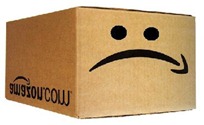 Salon has been the venue for plenty of gratuitous Amazon-bashing in the past. And the latest contribution is from senior Salon writer Laura Miller, who headlines her piece “Goodbye, Amazon: We’re through!” and adds, “I quit Amazon because of its monopolistic tactics. Is it impossible for book publishers to do the same?”
Salon has been the venue for plenty of gratuitous Amazon-bashing in the past. And the latest contribution is from senior Salon writer Laura Miller, who headlines her piece “Goodbye, Amazon: We’re through!” and adds, “I quit Amazon because of its monopolistic tactics. Is it impossible for book publishers to do the same?”
“I used to be an Amazon Prime member myself,” she admits, but continues, “I stopped buying any books, print or digital, from the company. What I knew of the predatory, proto-monopolistic practices of Amazon caused concern. I believe no single corporation should have as much control over the book market as Amazon clearly aims to seize.”
All this in the context of Amazon’s recent alleged hardball negotiating tactics with Hachette and other traditional publishers, which may or may not reflect Amazon abusing its quasi-monopolistic power. I and other TeleRead contributers have certainly picked up on enough counter-claims that Hachette may be spinning the story like crazy to its own advantage, with Nate Hoffelder asking “Is Hachette Playing Dirty Tricks in Their Contract Dispute With Amazon?” and another asserting that “if Hachette wanted to take advantage of Amazon Derangement Syndrome to score PR points in a pricing dispute with Amazon, it could hardly find a more credulous audience for a phony story than The New York Times, where all this began.” Or, it seems, Salon.
Perhaps Amazon is a legitimate target for a monopoly investigation, fine. But just one more time for the record, can we please revisit who gave Amazon their quasi-monopoly in the first place? That’s right: The traditional publishing industry. Exactly the people now feeding the animus of gullible journalists with manufactured scare stories designed to further their own business interests. The same Big Five counterparties of Apple in the ebook price rigging case. They could have put their own online storefronts up years, even decades ago. But they fought shy of etailing and ebooks for so long that Amazon was able to come in and fill the vacuum, with a DRM platform that still pisses off customers but that the publishers insist on. The publishers can still get round Amazon if they like, but so far they’re making a pretty ham-fisted job of it.
And if Laura Miller is 100% genuine and consistent about her opposition to monopolistic practices, perhaps she should just avoid Big Publishing too and buy direct from small presses and self-published authors. It can be done: Why not? The results can be surprisingly good. Better than beating up on Amazon for the benefit of Big Publishing anyway.


































Funny thing is, she says she still buys books from AbeBooks.
Does she know who owns AbeBooks now? (Hint: “Adjective that describes Wonder Woman’s nationality.”)